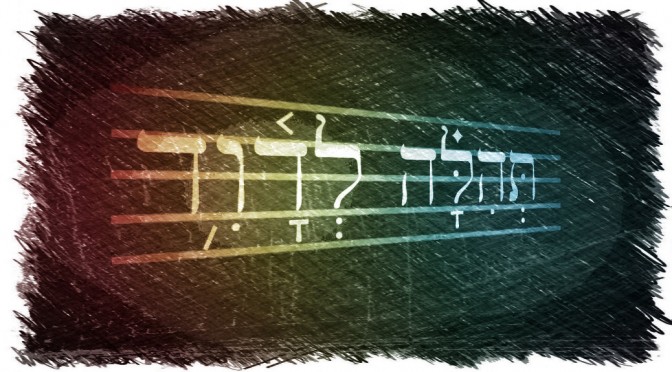
Lessons from the Psalm Inscriptions
In Leading God’s People in Prayer and Praise
Conclusion: What Can We Learn?
The psalm inscriptions offer a unique perspective on music and worship for the church musician. In this series we have examined the inscriptions under five categories:
I. DESIGNATION: Those titles using the Hebrew preposition לֹ lamed. They can denote the author(s) of the psalm, the recipient(s) of the psalm, to whom the psalm is dedicated, or possibly whom the psalm is about.
II. DESCRIPTION: Titles that state the type of poetic genre or musical composition. [psalm, maschil, song, praise, prayer, testimony, michtam]
III. EXPLANATION: Titles that provide a historical connection for the psalm. They relate the circumstances surrounding the composition of the psalm.
IV. APPLICATION: Titles that indicate the liturgical, devotional or didactic use of the psalm. [For the Sabbath Day, To Bring Remembrance, Of the Ascents]
V. INTERPRETATION: Titles that explain how the psalm should be musically interpreted or performed. [On Flutes, With Stringed Instruments]
[Download a PDF list of Psalm Inscriptions highlighted by category]
The psalms set a precedent and paradigm for church music through the ages. Although a measure of uncertainty still surrounds the meanings of some of psalm inscriptions, they are a part of God’s revelation in Scripture and have relevance for the present day. God has given us enough light to reveal some of their purposes within the Psalter. Those who serve God with the gift of music can especially benefit from a knowledge of these headings.
So what can we learn from the Psalm inscriptions? How can they be useful and encouraging to us as we magnify God through music in the present day? Here, in summary, are ten lessons we have gleaned over the course of the study:
1. The psalm inscriptions reveal a wide range of poetic and musical forms found in the psalms. These include psalms, songs, prayers, praises, testimonies, michtams, maschils, and shiggaions. This diversity in the Psalter sets a precedent for the vast tapestry of poetic and musical forms used in worship throughout church history.
2. The psalm inscriptions display a wide range of usefulness for music in worship. The psalms shape and accompany much of the content of Old Testament worship. They not only function as musical compositions, but also as prayers, wisdom literature and liturgical texts. According to the inscriptions, the poetic and musical forms in the Psalter provide helpful structure for singing, playing music, celebrating (at a wedding), petitioning God (in time of need), praising God, giving thanks to God, grappling with injustice, repenting of sin and declaring faith in God as He is at work in the lives of His people.
3. The inscriptions and especially the psalm texts themselves show the wide range of emotional expression possible and appropriate for worship. From the deepest valleys of anguish and despair in Psalm 88, to the sorrow and grief of Psalm 51, up to the highest peaks of joy and praise that culminate in Psalm 150, the psalms demonstrate the unmatched ability and usefulness of music to express such emotion. Enoch Hutchinson in Music of the Bible explains:
“The essence of lyric poetry is the immediate expression of feeling; and feeling is the sphere in which most of the psalms move. Pain, grief, fear, hope, joy, trust, gratitude, submission to God, everything that moves and elevates the heart is expressed in these songs.” [1]
4. The psalm titles demonstrate the wide range of musical expression possible in worship. Many types of instruments are mentioned in the inscriptions including stringed instruments, flutes, an instrument of Gath, as well as a host of others mentioned in the texts of the psalms themselves (such as Psalm 150). Vocal forces include solos (individual praise and lament) to “everything that has breath.”
5. The psalm inscriptions highlight the connection between music and God’s work in human history. They link the psalms to real situations recorded in Scripture and actual worship practices of ancient Israel and the Temple. We sing the words penned by David and other Old Testament songwriters as they looked to God for strength and help. We join our voices with God’s people in past ages, singing the words that carried their praise and comforted their hearts. The psalms remind us that we are part of something much larger than what we see God doing in our lives today. We are part of God’s covenant promises and plan of redemption that has shaped all of human history since the Garden of Eden to the present day.
6. The psalm inscriptions intimate a place for personal expression (I and me) in music for worship. The psalms are the heartfelt and authentic cries of David, Asaph and other songwriters, expressing their petitions and praises, their thanksgivings and laments. Though many of the psalms began as individual expressions of worship, expressed in the first person (I and me), God’s people in all ages have identified with the psalms and found an affinity with their message. We sing the words of the psalmists as our own because they express common experiences and feelings, such as remorse over sin, repentance of sin, praise to God, thanks to God, and adoration of God. The psalms demonstrate that we can address God in personal and intimate ways, though corporately as the gathered people of God.
7. The psalm titles suggest a connection between the popular or familiar music of the culture and music in worship. The sound of the music in the Temple was not markedly distinct from the music of the people. Temple musicians borrowed from familiar tunes, styles and instruments of the day. The psalms set a precedent for the church throughout its history to harness the music of the world for the glory of God. This is evident in the New Testament as well. In Ephesians 5:19 and Colossians 3:16, alongside psalms, Paul lists hymns, a musical form borrowed from pagan culture, first used to honor false Greek and Roman gods, but now synonymous with music of the church.
8. The psalm inscriptions reveal that our worship of God should extend beyond our times of gathered worship. The Psalms of the Ascents (120–134) were sung by Israel as they journeyed to the Temple in anticipating of corporate worship. We see David and others lifting praise and crying out to God in many situations and circumstances, in times of joy and in times of need. We can pray and sing to God at any time and in any place and He will hear us and answer us.
9. The psalm titles set a precedent for care and planning for music in worship. The psalmists were careful to include instructions concerning how the psalms should be musically performed. This involved care in using appropriate instruments and tunings, care in using the psalms for appropriate occasions, and care in finding the right tune to fit with a certain text. The psalm titles teach us the value of being thoughtful and intentional in preparing for and leading worship.
10. The psalm titles highlight the value of ministry of those who compose, compile, plan and lead music in worship. They remind us to give thanks for songwriters, musicians and worship leaders in the church. We need to encourage them and pray for them. We need to pray that God will raise up more servants in the church who will use their musical gifts for His glory and benefit of His people.
For more on Music and Worship, see “What Then Shall We Sing?”
Part 1: Thoughts on Music
Part 2: Thoughts on Music and Worship
Grid for Evaluating Music
Note:
[1] Psalm 4, 6, 54, 55, 61.
This series is based on a seminar paper for “Special Research in Church Music” at Southwestern Baptist Theological Seminary (May 1995).
See a Table of Contents for this series: Lessons from the Psalm Inscriptions
(Scripture quotations are from the Holy Bible, English Standard Version (ESV) ©2001 by Crossway)










